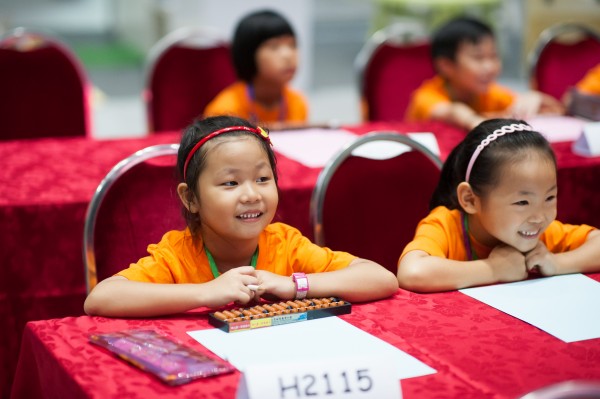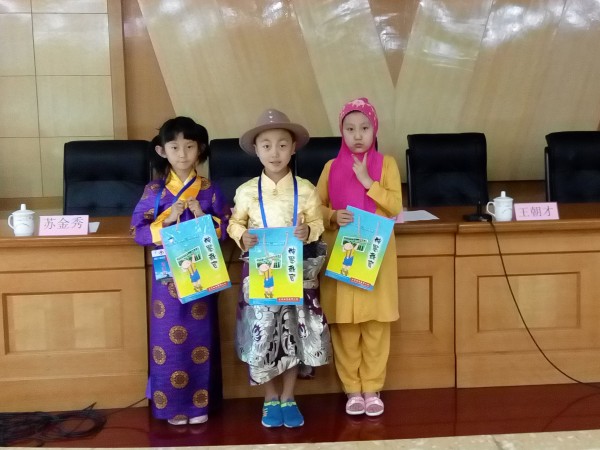SHENMO MOTTO: Virtue & Wisdom

-
Children cannot sit in classroom for ten minutes, but can stare at the screen for two hours?
2015-08-12 丨
The writer is from the Ministry of culture development

Research on “attention” has already begun very early, but until the recent decades, when the concept of child psychology and pedagogy have been defined, more and more parents in China started to realize that “attention” plays a decisive role in the learning ability of children.
At the same time, a contradictory phenomenon seems to perplex the parents in their understanding of this concept: my child is lively and likes to look around and jump up and down, so when writing homework, he/she cannot even sit for five minutes; but when watching TV or playing mobile phone or iPad, he/she can fix eyes on it for hours. The question is can this be regarded as attention or inattention?
Marie Winn’s best-selling book The Plug-In Drug mentions that: “One is always watching television when he/she doesn’t have any other experience but watching television”. She also used “one-way street” to describe the mental state when watching TV, namely, in one’s brain, there is only passive receiving of information without active processing of information.
Parents have communicated with us about the children’s experience of watching TV more than once: the children sit next to the TV, stare at the Pleasant Goat and Big Big Wolf or Thomas & Friends on TV, and will not be interrupted by other person. The parents think that the children concentrate attention, although sometimes their postures are not so good-looking… In fact, watching TV has no clear benefits to the learning ability and intellectual development of children. For the children or the adults, TV only causes passive attraction and passive attention.
What is passive attention?
Passive attention, also known as involuntary attention, refers to involuntary and spontaneous attention without conscious purpose or any effort. It is a simple and original reaction of the individual to external stimuli. The production of passive attention depends on the intensity of external stimuli, the greater the intensity, the easier the production of passive attention. For example, the louder people quarrel, the easier it will draw attention, but this kind of attention is involuntary, unplanned, and attracted. While most of the time, what we need is “active attention”, the opposite of passive attention, that is, the ability to actively focus on a thing—as adults, by thinking back carefully, we can find that this ability determines the efficiency of acquiring knowledge, perfecting skills, completing a task, and even preparing a dish and cleaning the room to a large extent.
Modern science and technology makes children’s world more colorful—colorful neon lights, colorful film and television, as well as colorful electronic games… the world may be very suitable for killing time and relieving the pressure; however, for children education, these things are not so friendly, after all, this virtual world is not as quiet and pleasant the natural world—high-speed flowing pictures, colorful video experience, and the exciting award for accomplishing mission, the long-term accumulation of which can damage the attention of the children, especially the active attention a lot.
Firstly, it diverts the children’s attention and shortens the time of focusing attention, especially the time of focusing attention on a single event, which can be shortened significantly: the specific embodiments are that the children cannot sit still or focus on doing one thing, even if playing a little game, they keep changing the content; their abilities of and interest in digging into and tackling a thing will be degraded and reduced. The research showed that if children at the age of 1 to 3 watch TV 1 hour a day, the probability of having attention problems of them at the age of 7 may increase 10%; the researchers also believe that the children watching TV more than 2 hours a day will have “two minutes of memory”, the result of which is that: the children cannot remember what they just said in two minutes, and then they will repeat the words or the questions before. The younger the children are and the more time they spend on TV, the more possible will they have attention problems; although the current research data in China is not detailed, from a qualitative point of view, based on which it can be deduced that watching TV can lead to focusing attention and organization of information problems.
Secondly, watching TV and playing electronic games will weaken the eyeball accommodation ability of children: the professional attention training will add ocular muscle training and eye focusing and eye-tracking training in preparatory stage to enable the children to fully prepare so that the effectiveness of attention training can be maximized. Staring at the screen closely for a long time is detrimental to the eye focusing and eye-tracking ability (eyes dull) and will hinder the development of attention physiologically. Of course, it is harmful to vision, which is well known.
Finally, watching TV makes the children follow the story, and they hardly think, do physical activity, or actively imagine useful things, then there is no room for creation—some scholars said that the amount of exercise of brain when watching TV is less than that when sleeping, which is not unreasonable.
The world’s most powerful graphics rendering computer is human brain. Without specific images, the children can imagine a variety of colorful pictures according to the story described by character or language, and it is exactly because of this function of human brain that there are countless great works of art and science and technology in the world; however, when the screen presents pictures (dynamic pictures), the brain will be “lazy”, namely, accepting these external pictures directly without imagining. If the children don’t use their imagination for a long time, the result is that the children will increasingly lack imagination with age.
Moreover, when the electronic screen occupies the children’s time for other intellectual activities (painting, puzzle games, construction toys, role-playing, etc.), it will have long-term influence on language and thinking development of the children, especially the seriously bad influence on the intelligence development of children under 6. When watching movies or playing games, we feel that “how time flies”, and even feel guilty about wasting time, not to mention the children spend their whole childhood in this fast-paced digital world.
With the social progress, on the one hand, the parents are “young and untrained”, on the other hand, they are busy with daily work; therefore, smart phones, tablet PCs, and digital TV have gradually become “magic parenting weapon”. It seems that as long as the baby are naughty, this magic weapon can immediately handle that—but if things continue this way, the lack of attention will greatly trouble the children in their study, work, and life.
At the same time, a contradictory phenomenon seems to perplex the parents in their understanding of this concept: my child is lively and likes to look around and jump up and down, so when writing homework, he/she cannot even sit for five minutes; but when watching TV or playing mobile phone or iPad, he/she can fix eyes on it for hours. The question is can this be regarded as attention or inattention?
Marie Winn’s best-selling book The Plug-In Drug mentions that: “One is always watching television when he/she doesn’t have any other experience but watching television”. She also used “one-way street” to describe the mental state when watching TV, namely, in one’s brain, there is only passive receiving of information without active processing of information.
Parents have communicated with us about the children’s experience of watching TV more than once: the children sit next to the TV, stare at the Pleasant Goat and Big Big Wolf or Thomas & Friends on TV, and will not be interrupted by other person. The parents think that the children concentrate attention, although sometimes their postures are not so good-looking… In fact, watching TV has no clear benefits to the learning ability and intellectual development of children. For the children or the adults, TV only causes passive attraction and passive attention.
What is passive attention?
Passive attention, also known as involuntary attention, refers to involuntary and spontaneous attention without conscious purpose or any effort. It is a simple and original reaction of the individual to external stimuli. The production of passive attention depends on the intensity of external stimuli, the greater the intensity, the easier the production of passive attention. For example, the louder people quarrel, the easier it will draw attention, but this kind of attention is involuntary, unplanned, and attracted. While most of the time, what we need is “active attention”, the opposite of passive attention, that is, the ability to actively focus on a thing—as adults, by thinking back carefully, we can find that this ability determines the efficiency of acquiring knowledge, perfecting skills, completing a task, and even preparing a dish and cleaning the room to a large extent.
Modern science and technology makes children’s world more colorful—colorful neon lights, colorful film and television, as well as colorful electronic games… the world may be very suitable for killing time and relieving the pressure; however, for children education, these things are not so friendly, after all, this virtual world is not as quiet and pleasant the natural world—high-speed flowing pictures, colorful video experience, and the exciting award for accomplishing mission, the long-term accumulation of which can damage the attention of the children, especially the active attention a lot.
Firstly, it diverts the children’s attention and shortens the time of focusing attention, especially the time of focusing attention on a single event, which can be shortened significantly: the specific embodiments are that the children cannot sit still or focus on doing one thing, even if playing a little game, they keep changing the content; their abilities of and interest in digging into and tackling a thing will be degraded and reduced. The research showed that if children at the age of 1 to 3 watch TV 1 hour a day, the probability of having attention problems of them at the age of 7 may increase 10%; the researchers also believe that the children watching TV more than 2 hours a day will have “two minutes of memory”, the result of which is that: the children cannot remember what they just said in two minutes, and then they will repeat the words or the questions before. The younger the children are and the more time they spend on TV, the more possible will they have attention problems; although the current research data in China is not detailed, from a qualitative point of view, based on which it can be deduced that watching TV can lead to focusing attention and organization of information problems.
Secondly, watching TV and playing electronic games will weaken the eyeball accommodation ability of children: the professional attention training will add ocular muscle training and eye focusing and eye-tracking training in preparatory stage to enable the children to fully prepare so that the effectiveness of attention training can be maximized. Staring at the screen closely for a long time is detrimental to the eye focusing and eye-tracking ability (eyes dull) and will hinder the development of attention physiologically. Of course, it is harmful to vision, which is well known.
Finally, watching TV makes the children follow the story, and they hardly think, do physical activity, or actively imagine useful things, then there is no room for creation—some scholars said that the amount of exercise of brain when watching TV is less than that when sleeping, which is not unreasonable.
The world’s most powerful graphics rendering computer is human brain. Without specific images, the children can imagine a variety of colorful pictures according to the story described by character or language, and it is exactly because of this function of human brain that there are countless great works of art and science and technology in the world; however, when the screen presents pictures (dynamic pictures), the brain will be “lazy”, namely, accepting these external pictures directly without imagining. If the children don’t use their imagination for a long time, the result is that the children will increasingly lack imagination with age.
Moreover, when the electronic screen occupies the children’s time for other intellectual activities (painting, puzzle games, construction toys, role-playing, etc.), it will have long-term influence on language and thinking development of the children, especially the seriously bad influence on the intelligence development of children under 6. When watching movies or playing games, we feel that “how time flies”, and even feel guilty about wasting time, not to mention the children spend their whole childhood in this fast-paced digital world.
With the social progress, on the one hand, the parents are “young and untrained”, on the other hand, they are busy with daily work; therefore, smart phones, tablet PCs, and digital TV have gradually become “magic parenting weapon”. It seems that as long as the baby are naughty, this magic weapon can immediately handle that—but if things continue this way, the lack of attention will greatly trouble the children in their study, work, and life.

-
NEXT:
“Licensing effect”—invisible stumbling block On Jul 08, 2015 >
LATEST

- First Online Shenmo Training for Ru On Mar 29, 2021

- Online Shenmo Entrepreneurship Exchange Meeting On Mar 29, 2021

- First Shenmo Online Abacus Mental M On Feb 03, 2021
EVENTS
Combination of Traditional Culture and Mo On Jun 02, 2020
Shenmo News:Shenmo Nigeria Abacus Mental On Oct 23, 2019
Shenmo News:The delegation of the 1st On Oct 21, 2019







